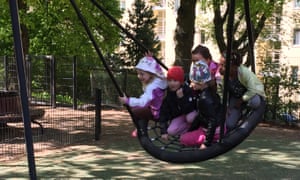No grammar schools, lots of play: the secrets of Europe’s top education system
In Finland children don’t start school until they are seven, but what happens before that is even more important

Gaining on the swings: Franzenia daycare centre, Helsinki, where the emphasis is on creative play. Photograph: Karin Hannukainen/University of Helsinki
It’s a warm September afternoon in the Kallio district of Helsinki. Out in theFranzenia daycare centre playground, groups of four- and five-year-olds roam contentedly. “Would you like an ice-cream?” asks one, having set up her elaborate “stall” on the edge of the sandpit. Kindergarten staff move among the children, chatting, observing and making written notes.
There is nothing outwardly distinctive about the centre, though with 200 children, it is the city’s largest. It is a tall, somewhat dour former university building, built in the 1930s and converted to its present role last year. Yet it is in places such as this oddly homespun centre with its strange echoes of bureaucracy, walls plastered with children’s art and piles of play paraphernalia, that the Finnish education “miracle” starts to take shape.
In Finland, whose comprehensive school system has sat at the top of Europe’s rankings for the past 16 years, the narrow, heated debates on school governance and structure that obsess the UK – free schools, academies, grammars – do not exist. Schools ultimately deliver academic success, the Finns would agree - and there has been intense worldwide interest in how they manage it (see below) – but they would also argue that groundwork for good school performance begins earlier, long before children enter formal school, and arguably while their future pupils are still in nappies.
Central to early years education in Finland is a “late” start to schooling. At Franzenia, as in all Finnish daycare centres, the emphasis is not on maths, reading or writing (children receive no formal instruction in these until they are seven and in primary school) but creative play. This may surprise UK parents, assailed as they are by the notion of education as a competitive race. In Finland, they are more relaxed: “We believe children under seven are not ready to start school,” says Tiina Marjoniemi, the head of the centre. “They need time to play and be No grammar schools, lots of play: the secrets of Europe’s top education system | Education | The Guardian:
